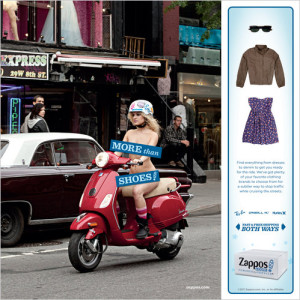
Ever seen a naked woman riding a Vespa?
You will this summer, if you read Cosmopolitan, Lucky, or InStyle magazines. It was revealed in the New York Times this week that Zappos will launch an ad campaign in August featuring nearly naked models doing everything from hailing a cab to playing Frisbee. The campaign touts Zappos apparel alongside its shoe collection, as evidenced by models that need to be clothed.
This venture is just another example of one of the marketing world’s favorite mantras: sex sells. The question is do brands end up suffering because of it?
A brand’s established image often determines whether sexual advertising succeeds or flops. Brands that already deal in sex appeal can get away with raunchy advertisements because the public understands that their brand embodies that kind of lifestyle. Brands recognized as innocent and unrelated to sexuality, however, can come under fire for a departure from their namesake image.
Take Calvin Klein. The clothing giant has garnered an edgy reputation since the 1980s, and has capitalized on this by releasing several controversial advertisements. Most of them featured teenagers in highly sexualized contexts, and some even depicted violence and rape.
However, criticism hasn’t seemed to diminish its presence in the fashion world. In fact, it almost compliments the image that Calvin Klein wants consumers to associate with its apparel: sexy, dangerous, and unhindered by public conventions. When all was said and done, the Calvin Klein brand survived.
Burger King, on the other hand, fared much worse when they tried a similar approach. Its raunchy advertisement from 2009 depicted a phallic-shaped sandwich aimed at the mouth of a woman, with the words “It’ll blow your mind away” in huge block-letters. Burger King’s brand of cheap, char-grilled hamburgers has virtually no connection to sex appeal, and so the ad got extremely poor reception.
Zappos may not have the street cred to ride the criticism wave like Calvin Klein, but should fare better than Burger King simply by nature of its product offerings. Many are under the impression that Zappos will succeed with the campaign because of its quirky, unconventional fashion brand.
Nathalie Binda, the marketing vice president for Lolë (a women’s active wear brand sold on Zappos), praised the campaign in the New York Times article as being “gutsy” and “very Zapposesque.” “If there was one brand out there that can do it, it’s them,” she said.
Contributed by Allison Meeks
